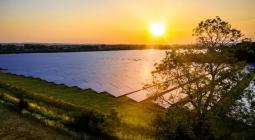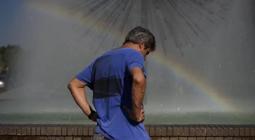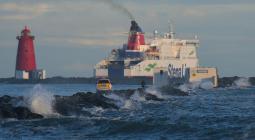False claims that heatwave is bogus spread online

False claims suggesting that the BBC has been misreporting temperatures in southern Europe have been spreading on social media.
A clip of Neil Oliver, a GB News presenter, accusing the BBC "and others" of "driving fear" by using "supposedly terrifying temperatures", has been viewed more than two million times.
For the past few weeks, an intense heatwave has been sweeping through parts of southern Europe and north Africa, with extensive wildfires breaking out in Greece, Italy and Algeria - leading to more than 40 deaths.
Speaking about the fires on Rhodes on GB News on Monday, Mr Oliver accused the BBC, and other broadcasters, of trying to "make people terrified of the weather".
"Those supposedly terrifying temperatures that were being predicted, all starting with a four... 40 this and 40 that... were obtained using satellite images of ground temperatures," he said.
"That's never been the temperature that's used in weather reporting and forecasting.
"On the contrary, those figures are the air temperature, a couple of feet above the ground surface ...the true temperatures, the air temperatures which actually happened, were in the 30s."
Mr Oliver's claim that the BBC was using ground temperatures is false, as several BBC weather presenters have pointed out.
BBC Weather bases its temperature reporting and forecasting on air temperatures.
For his other claim, that "true temperatures" were in the 30s, Mr Oliver didn't specify exact locations, but on Monday 24 July several places across Europe recorded air temperatures over 40C.
Lamia in Greece experienced an air temperature of 45C, as did Figueres in Spain (45.4C) and Gythio in Greece (46.4 °C) in previous days.
GB News did not respond to the BBC's request for a comment about Mr Oliver's clip. Mr Oliver has also been approached for comment.
How the BBC reports temperatures
BBC Weather - in keeping with other broadcasters and weather services - relies on temperature measurements taken in line with internationally agreed standards.
These are taken using thermometers that measure temperatures in the shade with a free movement of air.
For that reason, thermometers are placed inside Stevenson screens - purpose-built, white-slatted boxes at a height of 1.25m to minimise the effects of ground and nearby features on readings.
The air temperature measurements taken in countries affected by the heatwave will have been obtained using instruments and methods approved by the World Meteorological Organization (WMO), of which the UK is a member.
Weather stations, similar to this one, are used around the world to measure temperatures / GETTY IMAGES
Ground temperatures can be measured by thermometers and by satellites. On average, they can to be 10-15 degrees higher than air temperatures.
But these are not used in the BBC's weather reporting and forecasting.
Other claims about high temperatures
Some social media users have attacked BBC Weather forecasts, suggesting the reporting does not match real temperatures.
An air temperature of 48.2C was recorded in Jerzu, in Sardinia, Italy on Monday - the highest temperature in Europe so far this year.
BBC Weather was one of many news outlets reporting this record. But some social media users suggested the reports were inaccurate.
Robin Monotti, a film-maker with more than 81,000 followers on Twitter, claimed the BBC's reports were not backed by evidence.
But data published by Sardinia's own Regional Agrometeorological Service confirms the high temperatures reported.
Contacted by the BBC, Mr Monotti directed us to the Italian Meteorological Service's website, which listed different temperature readings for that day in Jerzu.
However, none of those readings were taken in Jerzu itself, but instead in nearby municipalities (with the nearest of those more than 13 miles away).
He then alleged that the equipment to get that particular temperature reading did not abide by international standards.
But Sardinia's Regional Agrometeorological Service makes clear on its website that its weather stations are operated according to WMO recommendations.
And the WMO also told the BBC that the temperature of 48.2C registered in Jerzu is consistent with data from other stations across Sardinia.
But it added that any temperature record is provisional until recognised by national or regional authorities, and ultimately by the WMO.
Sardinia's Regional Agrometeorological Service says it is carrying out "extra checks" to confirm this record.
Forecasting the weather
Weather forecasts are produced using complex computer models and updated once maximum temperatures have been reached.
Forecasters aim to get as close as possible to the actual temperatures.
Small variations in atmospheric conditions can make a significant difference to the weather which has been forecast.
A forecast temperature within a range of two degrees of the measured reading is considered by most meteorological organisations to be accurate.
But even if forecasts for cities or entire regions are correct, they do not always reflect small, local variations in temperature.
BBC Weather forecast temperatures of 47C on the Italian island of Sicily on 19 July.
A number of Twitter users, including Mr Monotti, claimed that the BBC's own weather website listed a much lower temperature of 37C in Palermo, the Sicilian capital.
Palermo's location meant the city remained cooler than other parts of the large Mediterranean island.
According to Sicily's Agrometeorological Information Service, the highest temperature recorded on that day was 44.8C in the municipality of Francofonte.
PICTURE: GB News presenter Neil Oliver





